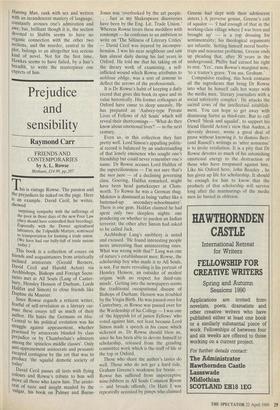Prejudice and sensibility
Raymond Carr
FRIENDS AND CONTEMPORARIES by A. L. Rowse
Methuen, £14.99, pp.297
his is vintage Rowse. The passion and
the prejudices lie naked on the page. Here IS an example. David Cecil, he writes, Showed
surprising sympathy with the sufferings of the poor in those days of the new Poor Law (they should have controlled their breeding). Especially with the Dorset agricultural , labourers, the Tolpuddle Martyrs, sentenced to transportation for forming a trade union. (We have had our belly-full of trade unions today.)
This book is a collection of essays on friends and acquaintances from artistically inclined aristocrats (Gerald Berners, David Cecil and Harold Acton) via Archbishops, Bishops and Foreign Secre- taries met at All Souls (Lang of Canter- bury, Hensley Henson of Durham, Lords Halifax and Simon) to close friends like Daphne du Maurier.
Since Rowse regards a reticent writer,
fearful of self-revelation as a literary cas- trato these essays tell us much of their author. He hates the Germans en bloc.
Central to his political evolution was his struggle against appeasement, whether practised by aristocrats blinded by class Prejudice or by Chamberlain's admirers
among the 'spineless middle classes'. Only anti-appeasement aristocrats and peasants
escaped contagion by the rot that was to Produce 'the squalid demotic society of today'.
David Cecil passes all tests with flying Colours and Rowse's tribute to him will move all those who knew him. The aristo- crat of taste and insight mauled by the vulgar, his book on Palmer and Burne-
Jones was 'overlooked by the art people. . . . Just as my Shakespeare discoveries have been by the Eng. Lit. Trade Union.' Whereas Rowse treats these meddlers with contempt — he confesses to an ambition to write on 'The Silliness of Literary Critics' — David Cecil was injured by incompre- hension. I was his near neighbour and saw him almost daily during his last years in Oxford. He told me that his taking on of the dreary work of examining, a self- inflicted wound which Rowse attributes to noblesse oblige, was a sort of armour to deflect the arrows of the professionals.
It is Dr Rowse's habit of keeping a daily record that gives this book its spice and its value historically. His former colleagues at Oxford have cause to sleep uneasily. He has prepared an 'Aubrey-type Private Lives of Fellows of All Souls' which will reveal their shortcomings — 'What do they know about emotional lives?' — in the next century.
Even so, in this collection they fare pretty well. Lord Simon's appalling politic- al record is balanced by an understanding of that lonely eminence who sought one's friendship but could never remember one's name. Dr Rowse accuses Lord Halifax of the superciliousness -- I'm not sure that's the mot juste — of a declining governing class. Goering, Halifax remarked, might have been head gamekeeper at Chats- worth. To Rowse he was a German thug. Molotov is dismissed as being 'rather like a
buttoned-up secondary-schoolmaster'. There is one gem. Halifax claimed he had spent only two sleepless nights: one pondering on whether to pardon an Indian terrorist; the other after Simon had asked to be called Jack.
Archbishop Lang's snobbery is noted and excused. 'He found interesting people more interesting than uninteresting ones. What was wrong with that?' Lang was one of nature's establishment men; Rowse, the scholarship boy who made it to All Souls, is not. Far more revealing is his portrait of Hensley Henson, an outsider of modest origins `with no respect for third-rate minds'. Getting into the newspapers seems the traditional occupational disease of Bishops of Durham: Henson was troubled by the Virgin Birth. He was passed over for Canterbury, as Rowse was passed over for the Wardenship of his College — I was one of 'the hippyish lot of junior Fellows' who voted against him, not least because Lord Simon made a speech in his cause which sickened us. Dr Rowse should bless us, since he has been able to devote himself to scholarship, released from the grinding committee work which is the stuff of life at the top in Oxford.
Those who share the author's tastes do well. Those who do not get a hard ride Graham Greene's weakness for booze — Rowse has suffered from imperceptive wine-bibbers in All Souls Common Room — and broads offends. (In Haiti I was repeatedly accosted by pimps who claimed Greene had slept with their adolescent sisters.) A perverse genius, Greene's cult of squalor — 'I had enough of that in the working-class village where I was born and brought up' — is a top dressing for sentimentality; his theological arguments are infantile. Setting himself moral booby- traps and nonsense problems, Greene ends up pleading that, after 30 years in the underground, Philby had earned his right to rest. 'Yes', runs Rowse's marginal note, `to a traitor's grave. You ass, Graham.'
Compulsive reading, this book contains all the ingredients that bring Dr Rowse into what he himself calls hot water with the media men, 'literary journalists with a social inferiority complex'. He attacks the sacred cows of the intellectual establish- ment. You can hope to get away with dismissing Sartre as third-rate. But to call Orwell 'bleak and squalid', to support his friend Harold Acton's view that Auden, a slovenly dresser, wrote a great deal of prose without knowing it, to dismiss Bert- rand Russell's writings as 'utter nonsense' is to invite retaliation. It is a pity that Dr Rowse devotes so much of his astonishing emotional energy to the destruction of those who have trespassed against him. Like his Oxford hero, John Beazley , he has given up life for scholarship. It should be enough for him to know that the products of that scholarship will survive long after the murmurings of the media men lie buried in oblivion.


































































 Previous page
Previous page